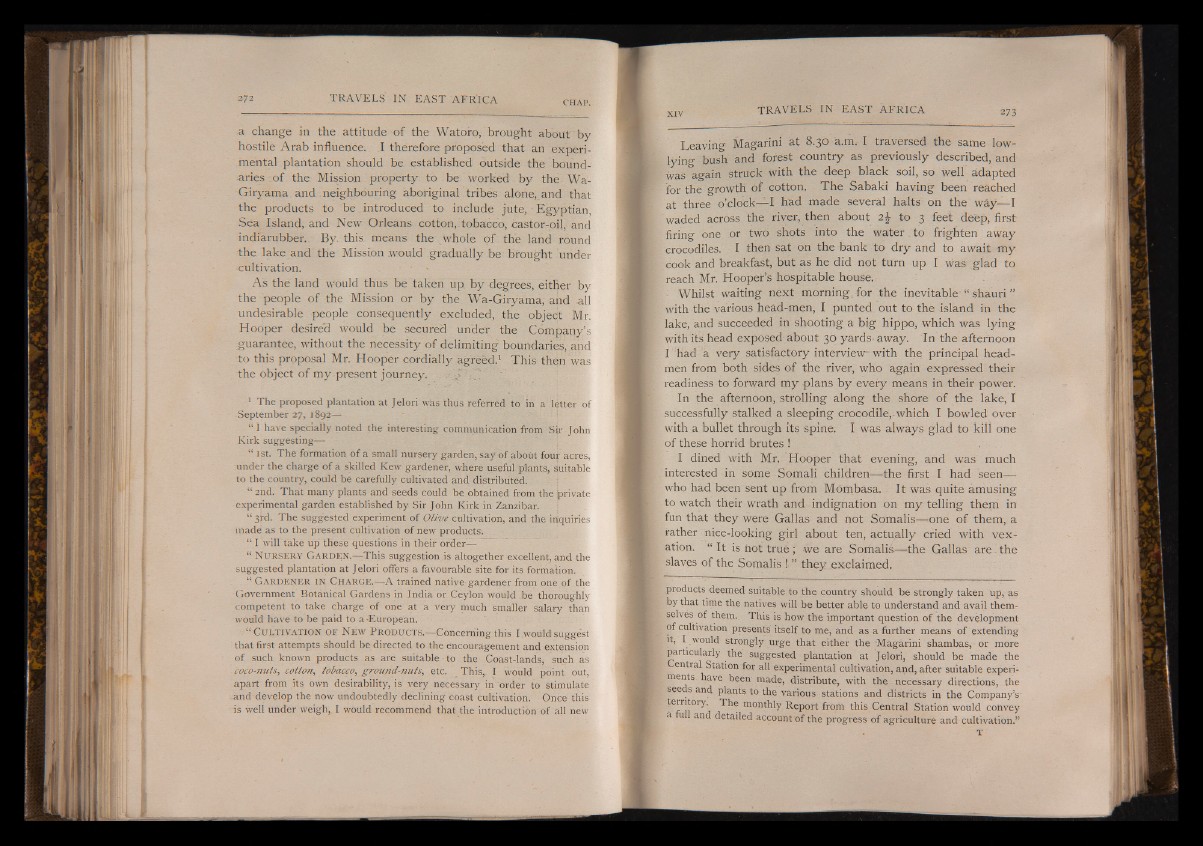
a change in the attitude of the Watoro, brought about by
hostile Arab influence. I therefore proposed that an experimental
plantation should be established outside the boundaries
of the Mission property to . be worked by the Wa-
Giryama and neighbouring aboriginal tribes alone, and that
the products to be introduced to include jute, Egyptian,
Sea Island, and New Orleans cotton, tobacco, castor-oil, and
indiarubber. By. this means the whole of the land round
the lake and the Mission would gradually be brought under
•cultivation.
As the land would thus be taken up by degrees, either by
the people of the Mission or by the Wa-Giryama, and all
undesirable people consequently excluded, the object Mr.
Hooper desired would be secured under the Company’s
guarantee, without the necessity of delimiting' boundaries, and
to this proposal Mr. HQoper cordially agreed.1 This then was
the object of my present journey. . x jp C
1 The proposed plantation at Jelori was thus referred to in a letter of
September 27, 1892—
“ I have specially noted the interesting communication from Sir John
Kirk suggesting—
“ 1 st. The formation of a small nursery garden, say of about four acres,
under the charge of a skilled Kew gardener, where useful plants, Suitable
to the country, could be carefully cultivated and distributed.
“ 2nd. That many plants and seeds could be obtained from the ¡private
experimental garden established by Sir John Kirk in Zanzibar.
“ 3rd. The suggested experiment of Olive cultivation, and the inquiries
made as to the present cultivation of new products.
“ I will take up these questions in their order—
“ N u r s e r y G a r d e n .— This suggestion is altogether excellent, and the
suggested plantation at Jelori offers a favourable site for its formation.
“ G a r d e n e r in C h a r g e .— A trained native gardener from one of the
•Government Botanical Gardens in India or Ceylon would .be thoroughiy
competent to take charge of one at a very much smaller salary than
would have to be paid to a -European.
“ C u l t iv a t io n o f N ew P r o d u c t s .— Concerning this I would sugge'st
that first attempts should be directed to the encouragement and extension
of such known products as are suitable to the Coast-lands, such as
coco-nuts, cotton, tobacco, ground-nuts, etc. This,. I would point out,
apart from its own desirability, is very necessary in order to stimulate
and develop the now undoubtedly declining coast cultivation. Once this
is well under weigh, I would recommend that the introduction of all new
Leaving Magarini at 8.30 a.m. I traversed the same low-
lying bush and forest country as previously described, and
was again struck with the deep black soil, so well adapted
for the growth of cotton. The Sabaki having been reached
at three o’clock— I had made several halts on the way— I
waded across the river, then about 2\ to 3 feet deep, first
firing one or two shots into the water to frighten away
crocodiles. I then sat on the bank to dry and to await my
cook and breakfast, but as he did not turn up I was glad to
reach Mr. Hooper’s hospitable house.
\ Whilst waiting next morning, for the inevitable- “ shauri ”
with the various head-men, I punted out to the island in the
lake, and succeeded in shooting a big hippo, which was lying
with its head exposed about 30 yards- away. In the afternoon
I had a very satisfactory interview- with the principal headmen
from both sides of the river, who agffin expressed their
readiness to forward my plans by every means in their power.
In the afternoon, strolling along the shore of the lake, I
successfully stalked a sleeping crocodile, which I bowled over
with a bullet through its spine. I was always glad to kill one
of these horrid brutes !
I dined with Mr. Hooper that evening, and was much
interested in some Somali children— the first I had seen—
who had been sent up from Mombasa. It was quite amusing
to watch their wrath and indignation on my telling them in
fun that they were Gallas and not Somalis—-one of them, a
father nice-looking girl about ten, actually cried with vexation.
“ It is hot true ; we are Somalis— the Gallas are. the
slaves of the Somalis 1 ” they exclaimed.
products deemed suitable to the country should be strongly taken up, as
by that time the natives will be better able to understand and avail themselves
of them. This is how the important question of the development
of cultivation presents itself to me, and as a further means of extending
it, I would strongly urge that either the ‘Magarini shambas, or more
particularly the suggested plantation at Jelori, should be made the
Central Station for all experimental cultivation, and, after suitable experiments
have been made, distribute, with the necessary directions, the
|/Seeds and plants to the various stations and districts in the Company’s-
territory. The monthly Report from this Central Station would convey
a u and detailed account of the progress of agriculture and cultivation.”